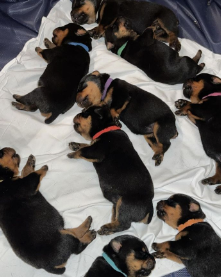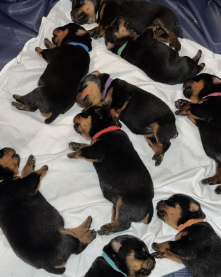Puppies are adorable bundles of joy, but many new dog owners wonder when their little companions will start to open their eyes and stop growing. This article will cover both of these critical milestones to help you understand your puppy’s development. Whether you have a Rottweiler or another breed, these stages are universal for most dogs.
When Do Puppies Open Their Eyes?
Puppies are born blind and deaf, which helps protect their fragile systems as they adjust to life outside the womb. During the first few days of life, they rely entirely on their mother for warmth, nutrition, and care. So, when do puppies open their eyes?
- Eyes Open Around 10 to 14 Days: Typically, puppies open their eyes between 10 and 14 days after birth. This can vary slightly depending on the breed and individual puppy, but most puppies start slowly peering at the world around this time.
- Vision Development: While their eyes may open, puppies won’t have perfect vision immediately. Their eyesight will develop gradually over the next several weeks. At first, they can only see blurry shapes and movement. When they reach 8 weeks old, puppies usually have more defined vision.
- Care During This Period: It’s important not to force your puppy’s eyes open before they are ready. Keep their environment clean, warm, and comfortable, and let them develop at their own pace. Puppies at this stage still need plenty of rest and should be handled gently.
When Do Puppies Stop Growing?
The growth period for puppies is filled with exciting changes. They start as small, helpless creatures and grow into strong, independent dogs. But when do puppies stop growing?
- Small Breeds Stop Growing Around 9 to 12 Months: The growth period is shorter for smaller dog breeds. Many small dogs, such as Chihuahuas or Dachshunds, will reach their full size by 9 to 12 months of age. They tend to mature faster because they have less growth to do.
- Medium to Large Breeds Stop Growing Around 12 to 18 Months: Medium and large breeds, including Rottweilers, typically take longer to stop growing. These dogs may continue to grow and fill out until they are about 18 months old. Rottweilers, in particular, can continue to build muscle mass even after this period.
- Giant Breeds Take the Longest: Some of the largest dog breeds, such as Great Danes or Saint Bernards, can take up to 2 years to fully mature. These giant breeds have larger bones and bodies, which require more time to reach their final size.
Factors That Influence Puppy Growth
While breed significantly affects how long a puppy grows, other factors can also affect this process.
- Nutrition: Providing your puppy with a balanced diet supports healthy growth. Choose high-quality puppy food that meets their specific breed’s needs. Rottweilers, for example, require food that supports muscle development and bone health.
- Exercise: Puppies need regular exercise to grow strong and healthy, but it’s important not to over-exercise them while growing. Too much strenuous activity can stress their developing bones and joints unnecessarily.
- Genetics: Every puppy is unique, and genetics play a significant role in determining when a puppy stops growing. Some puppies may grow faster or slower than others, even within the same breed.
How to Care for Growing Puppies
Caring for a growing puppy requires attention to their diet, exercise, and overall health. Here are some tips to ensure your puppy grows strong and healthy:
- Feed a balanced diet that supports their growth.
- Provide plenty of rest, as puppies need a lot of sleep to develop properly.
- Engage in gentle exercise appropriate for their age and breed.
- Visit the vet regularly for check-ups and vaccinations to ensure they grow properly and are free of health issues.
Conclusion
Puppies are delightful but require care and attention as they go through critical developmental stages. Most puppies open their eyes between 10 and 14 days after birth, and their vision gradually improves. When it comes to growth, smaller breeds stop growing by about 9 to 12 months, while larger breeds like Rottweilers may continue growing until they are 18 months old or more.
You can ensure that your puppy grows into a healthy and happy adult dog by providing proper nutrition, exercise, and healthcare. Whether raising a Rottweiler or another breed, understanding these milestones will help you give your puppy the best start.




